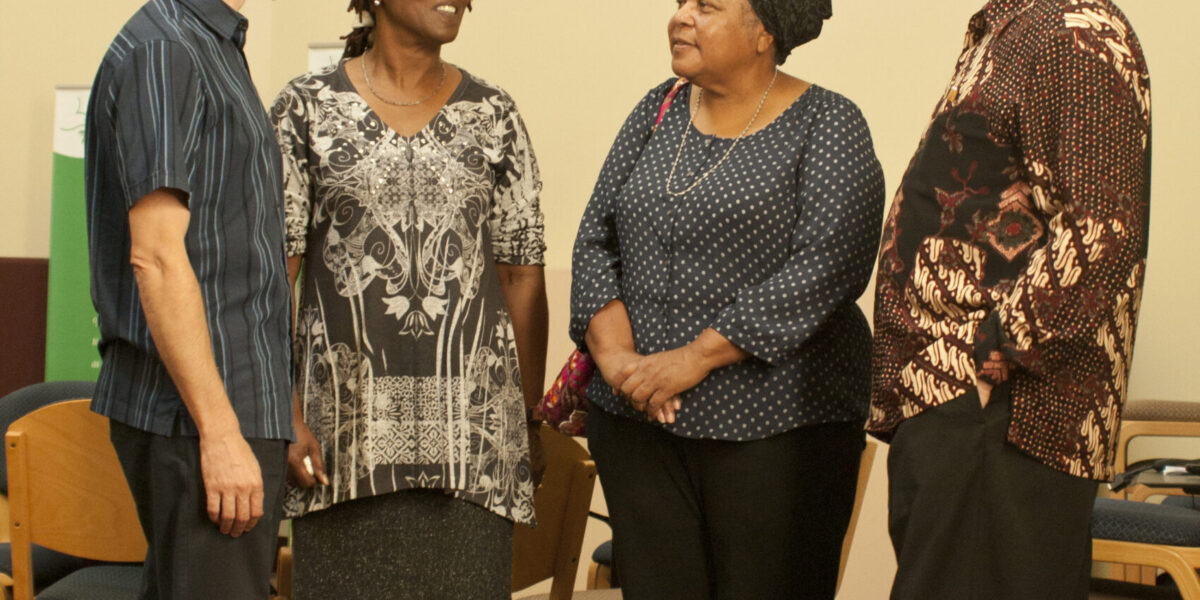ELKHART, Ind. (Mennonite Church USA/Mennonite Mission Network) – Shoulder-tapping and sharing inside information will help Mennonite leadership more accurately reflect the diversity that is within the church, said Wilma Bailey, who specializes in Old Testament studies at Christian Theological Seminary in Indianapolis.
Bailey shared her insights during a Sept. 25 visit to the six Mennonite agencies located in the denomination’s Elkhart offices. Bailey explained that true diversity and inclusion require the work of “white allies,” people of a dominant white culture who act in solidarity with people of color without assuming control of the struggle for human dignity. In doing so, white allies take responsibility to heal their own racism.
Bailey said that one of the best ways to be a white ally is to provide opportunities for people of color by affirming their gifts through shoulder-tapping and sharing the information usually only accessible to those within the inner circle of white privilege.
“When people of color come into an organization, they often don’t have the inside information to know how an organization really works. They only have what is written in the manuals,” Bailey said. “We need to make a real effort to identify young people of color who can be potential leaders, and invite them to be part of decision-making early in the process, so they can help shape the outcome.”
Because there are still very few people of color holding leadership positions in the Mennonite Church, the advance notice that often lands jobs before they are publically posted isn’t available to them.
“Most leaders are white men, so when they think of a successor who can carry on their work, they think of a white male. They just can’t imagine a black female being able to fill their shoes,” Bailey said.
There have been exceptions in Bailey’s life and they have helped her become a much-sought-after scholar, professor, consultant and lecturer with three graduate degrees, including a PhD from Vanderbilt University. She is currently teaching at Christian Theological Seminary in Indianapolis where she specializes in Old Testament studies like “Race and Ethnicity in the Hebrew Bible and Contemporary Interpretation.” She has also authored several books, Bible study guides, and academic papers. One current project is a commentary on the book of Lamentations.
“Many times we don’t even know who our white allies are because they work behind the scenes,” Bailey said. “In my professional positions, it was usually someone who called me and asked me if I wanted a job.”
One of these times was soon after Bailey graduated with a Master’s in divinity from what is now Anabaptist Mennonite Biblical Seminary. A white church leader, John Paul Wenger, called her and asked her to serve as the assistant pastor of a Mennonite church in Saginaw, Mich. When Bailey began her ministry at Grace Chapel, she became the first woman to be licensed by the Indiana-Michigan Mennonite Conference.
Another white ally, Walter Harrelson, who was one of the translators of the New Revised Standard Version Bible, gave Bailey a big step up in the academic world when he asked her to be his teaching assistant. She went on to help him with research.
In becoming a white ally, as in all cross-cultural communication, occasions for making mistakes and offending others are inevitable. Bailey advocates for a posture of grace and reconciliation for both white people and people of color.
“If you show anger and alienate yourself, others will shut you out. We all have the potential to change,” Bailey said.
Rose Stutzman, curriculum editor for MennoMedia, one of the Mennonite agencies located in the Elkhart office building, said that she was deeply grateful for Bailey’s presentation.
“I know that the really important work of being a white ally is to confess our racist attitudes, acknowledge our white privilege, and listen. I’m also happy to hear Wilma suggest more concrete ways I can be a white ally,” Stutzman said.
Stanley Green, executive director of Mennonite Mission Network, thanked Bailey for her generosity when a brief meet-and-greet turned into a tutorial on the peace stance of God’s people in the Old Testament.
“Wilma explained to us how the English translations of the Old Testament are bloodier and more violent than they are in the original Hebrew text,” said Rachel Stoltzfus, Mission Network’s senior executive for Human Resources. “As Anabaptists, we base our peace position on Jesus’ teaching, but there is a basis for it in the Old Testament as well.”
Nancy Kauffmann, denominational minister for the leadership development office of Mennonite Church USA, remembered her seminary days with Bailey. “Wilma is a totally authentic person. She is gentle, but doesn’t hesitate to go right to the point,” Kauffmann said.
Bailey is also very generous in sharing her knowledge and experience with Mennonite institutions. She served on boards for the Mennonite Board of Education and Mennonite Central Committee. She is currently a member of the Board of Trustees of Eastern Mennonite University. She attends Shalom Mennonite Church in Indianapolis.
Bailey’s visit to Elkhart was organized by a volunteer interoffice LURE team that schedules “Learning to Undo Racism Events” several times per year.
###
For immediate release
Mennonite Mission Network, the mission agency of Mennonite Church USA, leads, mobilizes and equips the church to participate in holistic witness to Jesus Christ in a broken world. Media may contact news@mennonitemission.net.







